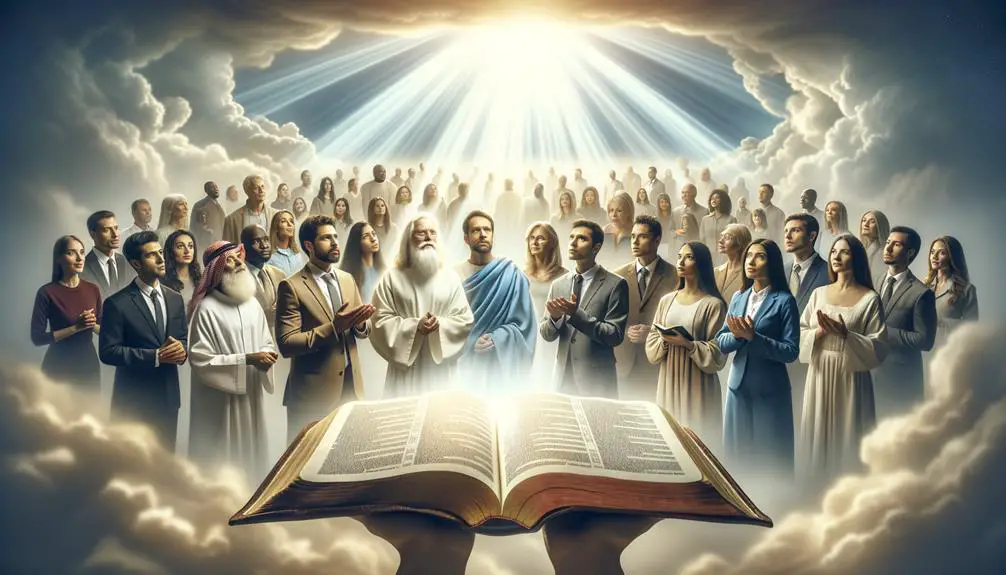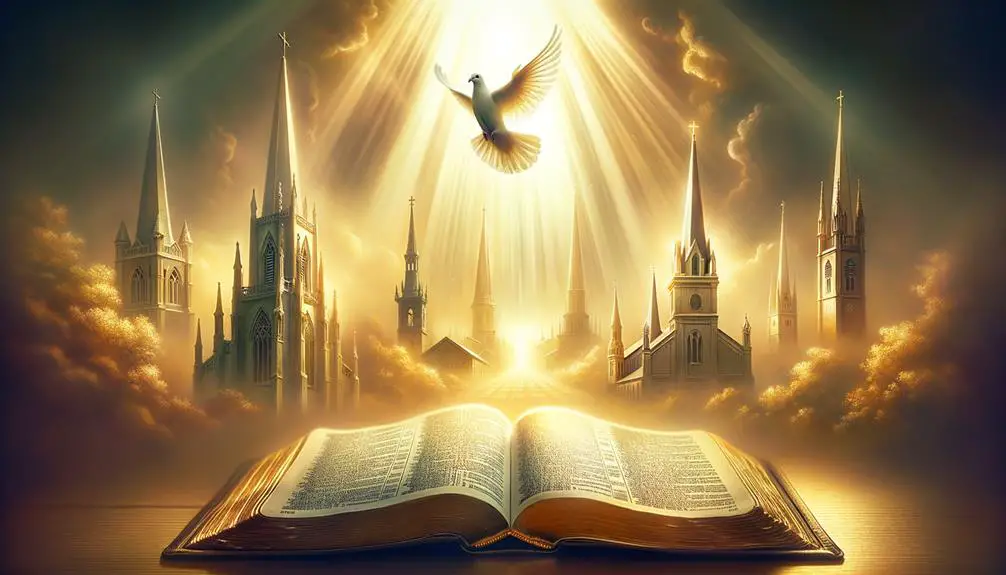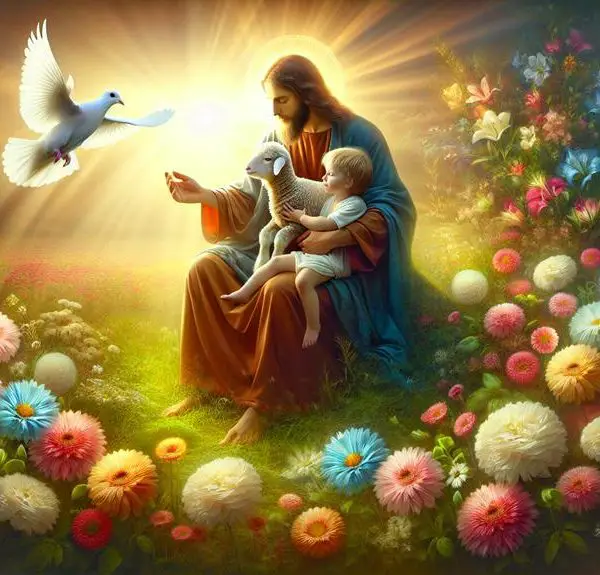Discover why the word 'rapture' isn't found in the Bible, yet its concept sparks widespread theological debate and interpretation.

Where in the Bible Is the Word Rapture
You might've heard the term 'rapture' tossed around in religious discussions, but have you ever stopped to consider if it's directly mentioned in the Bible? This concept, often linked with the end times and the second coming of Christ, isn't labeled with the term 'rapture' in the scriptures. Yet, passages in Thessalonians and Corinthians hint at a similar phenomenon, sparking debates among theologians and believers alike.
As you explore further, you'll uncover how interpretations vary and why understanding these nuances could shift your perspective on biblical prophecy and modern religious beliefs.
Key Takeaways
- The term "Rapture" is not explicitly found in the Bible; concepts stem from Paul's letters, particularly in Thessalonians.
- Key Rapture concepts are derived from interpretations of scriptural passages rather than direct mentions of the word.
- Discussions on Rapture, including its timing and nature, are based on broader biblical teachings on end times, especially in Thessalonians and Revelation.
- Beliefs surrounding the Rapture reflect diverse interpretations across Christian denominations, influenced by scriptural analysis and theological tradition.
The Origin of "Rapture

The concept of 'Rapture' originates from interpretations of biblical scripture, particularly from the New Testament, where it's described as a moment when believers will be caught up together with Christ. This idea, while not explicitly named 'Rapture' within the scripture, has undergone extensive etymology exploration to understand its origins and how it has been framed within theological discourse. The term itself is derived from the Latin word 'rapturo,' which translates to a forceful pulling or taking away. This linguistic root is pivotal in understanding how the concept has been interpreted and taught throughout Christian history.
Analyzing the cultural impact of the Rapture reveals its significant influence on Christian eschatology and how believers view the end times. The anticipation of being taken up with Christ has shaped not only personal faith practices but also the broader cultural narrative around death, the afterlife, and the second coming of Christ. It's fascinating to observe how this theological concept has permeated various aspects of culture, including literature, film, and art, often depicting the dramatic and transformative nature of the Rapture.
Furthermore, the exploration of its etymology and cultural resonance helps to frame the Rapture not just as a theological event but as a phenomenon that has captured the imagination and hopes of believers. It underscores the power of scriptural interpretation in shaping religious beliefs and highlights the dynamic interplay between sacred texts and the cultural contexts in which they're understood and celebrated.
Thessalonians and the Rapture
You'll find that Paul's letters to the Thessalonians are pivotal for understanding the concept of the Rapture within Christian eschatology.
They offer a scriptural basis for the Rapture, meticulously described and analyzed through key verses. This examination highlights the nuanced interpretations and theological implications inherent in these texts.
Paul's Letter Explained
Paul's letters to the Thessalonians delve deeply into the concept of the Rapture, providing an essential foundation for understanding this eschatological event. After Paul's conversion, his Apostolic missions led him to Thessalonica, where his teachings on the end times left a significant mark. Analyzing these letters reveals:
- Paul's Transformation: His conversion experience profoundly influenced his theological outlook, emphasizing the imminent return of Christ.
- Apostolic Missions: The missions were pivotal in spreading the message of salvation and the Rapture, preparing early Christians for the end times.
- Eschatological Teachings: Paul's letters are rich in eschatology, presenting the Rapture not as a distant myth but as a forthcoming reality for believers.
His insights offer a critical lens through which to view the concept of the Rapture, grounded in early Christian teachings and expectations.
Rapture Described Scripturally
Delving into the Thessalonians, one finds quintessential scriptural references to the Rapture, a concept that intertwines with early Christian eschatology and Paul's profound teachings on the matter.
The discourse surrounding the Rapture in Thessalonians has fueled an eschatological debate that centers on whether this event precedes or follows the Tribulation, a period of suffering and turmoil before the Second Coming. Advocates of the pre-tribulation concept argue that believers will be taken up before this period, highlighting Paul's letters as foundational to this belief.
This interpretation suggests a period of grace and protection for the faithful, underscoring an escapist view of end-time events. Paul's epistles thus serve as a critical junction in understanding the intricacies of Christian eschatology and the nuanced positions within it.
Key Verses Highlighted
Exploring the Thessalonians further, we encounter key verses that illuminate the concept of the Rapture, marking pivotal moments in Christian eschatological thought. These passages are central to eschatological debates, providing a fertile ground for diverse interpretive methodologies.
Here are three essential references:
- 1 Thessalonians 4:16-17 – Describes believers being caught up together with the resurrected in the clouds to meet the Lord, a cornerstone for Rapture theology.
- 2 Thessalonians 2:1-3 – Warns against deception regarding the Day of the Lord, emphasizing the importance of steadfast faith amidst eschatological anticipation.
- 1 Thessalonians 5:2-3 – References the Day of the Lord coming like a thief, highlighting the unpredictability of these eschatological events.
These verses underscore the complexity and depth of eschatological discussions within Christian theology.
Corinthians: Mystery Revealed
In Corinthians, the concept of 'rapture' is unveiled through a profound theological framework that challenges believers to rethink notions of the end times. The Apostle Paul addresses the Corinthian church, a diverse community grappling with issues of Gentile inclusion and the operation of spiritual gifts. Through his letters, Paul elucidates a mystery that had been hidden for ages but is now revealed to the saints: the sudden transformation and catching up of believers to meet the Lord in the air.
Aspect |
Explanation |
|---|---|
Gentile Inclusion |
Paul's letters to the Corinthians emphasize the breaking down of barriers between Jews and Gentiles, indicating that the rapture is a promise for all believers, irrespective of their ethnic background. |
Spiritual Gifts |
He also discusses the importance of spiritual gifts in preparing the church for the coming of the Lord, suggesting that these gifts play a role in readying believers for their eventual transformation. |
Mystery Revealed |
Paul describes the rapture as a mystery now made known, a sudden event that will change believers "in a moment, in the twinkling of an eye". |
Transformation |
The mortal bodies of believers will be transformed into immortal, glorified bodies, capable of inhabiting the new heaven and earth. |
This analysis reveals that the discussion in Corinthians about the end times is multi-faceted, touching on themes of inclusion, spiritual readiness, and divine mystery. It presents the rapture not just as an event of escape but as a culmination of God's redemptive plan for all who believe, regardless of their heritage or spiritual gifts.
Matthew's End Times Prophecy

While Corinthians provides a profound understanding of the rapture, Matthew's gospel offers a complementary perspective on end times prophecy, emphasizing the signs and conditions preceding this eschatological event. Here, you'll find the Olivet Discourse, a pivotal moment where Jesus outlines the future with specificity and caution, especially highlighting the emergence of false prophets and the need for vigilance among believers.
In analyzing Matthew's narrative, three key elements emerge that underscore the gravity and imminence of end times prophecy:
- The Significance of the Olivet Discourse: This discourse serves as a comprehensive briefing on the end times, delivered by Jesus on the Mount of Olives. It's a direct response to the disciples' query regarding the signs of Jesus' coming and the end of the age. Here, the emphasis is placed on awareness and readiness.
- The Warning Against False Prophets: Jesus explicitly warns of the rise of false prophets who'll deceive many. This underscores the critical need for discernment among believers, as these deceivers will perform great signs and wonders to mislead, if possible, even the elect.
- The Call for Vigilance: The discourse concludes with a stern admonition for vigilance. Believers are urged to stay awake, for they don't know on what day their Lord will come. This vigilance isn't just about watching for signs but also about maintaining faithfulness and integrity in one's life.
Matthew's end times prophecy, therefore, complements the rapture narrative by providing a broader context of anticipation and preparedness. It's an invitation to live with purpose and watchfulness, aware of the challenges and false teachings that may arise as the age draws to a close.
Revelations and the Elect
The Book of Revelation offers a profound and complex portrait of the elect's role in the end times, emphasizing their perseverance and ultimate salvation amidst tribulation. This scriptural segment intricately intertwines with Daniel's prophecy, presenting a timeline that scholars have extensively analyzed to understand the events leading to the final judgment and the ultimate fate of the elect. The Tribulation period, a pivotal era detailed in these prophecies, is characterized by trials and suffering, testing the faith of believers worldwide.
Revelation's narrative elaborates on the hardships faced by the elect during the Tribulation, underlining their resilience and steadfast faith. This period, as foretold, involves a sequence of cataclysmic events, each designed to challenge the moral and spiritual fiber of humanity. The elect's endurance through these trials is portrayed not just as a testament to their unwavering faith but also as a fulfillment of Daniel's prophecy, which foresees a time of unparalleled distress, out of which the elect are delivered.
As you delve deeper into the text, it becomes evident that Revelation and Daniel's prophecy collectively underscore the Tribulation period as a crucible for refining the elect. This eschatological vision serves not only to forewarn but also to offer hope of redemption and salvation. The perseverance of the elect, amidst adversity, emerges as a central theme, highlighting their role as bearers of faith through the darkest chapters of human history. This scholarly interpretation invites readers to contemplate the depth of their own faith and the implications of enduring through tribulation, underscoring the biblical narrative's relevance across ages.
Interpretations Across Denominations

Understanding the elect's perseverance through tribulation offers a foundation for exploring how various denominations interpret these eschatological themes. Across Christianity, interpretations of the rapture and the end times diverge significantly, shaped by historical contexts, theological debates, and the outcomes of ecumenical councils. These differences not only influence doctrinal teachings but also the personal beliefs of millions of faithful worldwide.
Here are three key interpretations:
- Pre-Tribulation Rapture: Advocated by many Evangelical and Fundamentalist groups, this view holds that the rapture will occur before the Great Tribulation, sparing believers from its hardships. This perspective often hinges on a literal interpretation of prophetic biblical texts.
- Mid-Tribulation and Post-Tribulation Raptures: These views, found in some Mainline Protestant denominations, suggest that the rapture will occur either midway through or after the Tribulation, respectively. Proponents argue that these interpretations align more closely with the notion of the elect's perseverance and the refining purpose of tribulation.
- Amillennial and Postmillennial Perspectives: Many traditional denominations, including Roman Catholic and Orthodox, typically lean towards amillennialism or postmillennialism, which interpret the rapture and millennial reign of Christ allegorically rather than literally. These views emphasize the Church's role in gradually bringing about the Kingdom of God on earth, with less focus on a singular rapture event.
Ecumenical councils and theological debates have continually shaped these interpretations, highlighting the diversity of thought within Christianity regarding end-time events. Each denomination's stance reflects its broader theological commitments and interpretive approaches to Scripture, contributing to the rich tapestry of Christian eschatology.
Modern Views on the Rapture
In today's rapidly evolving world, you'll find that modern views on the rapture reflect a spectrum of beliefs influenced by both traditional interpretations and contemporary theological insights. The pre-tribulation debate, a key element of this discussion, centers around the timing of the rapture in relation to tribulation—a period of trial and suffering prophesied in the Bible. This debate highlights a division among Christians, with some advocating for a pre-tribulation rapture, where believers are taken to heaven before the tribulation begins, and others supporting a post-tribulation view, suggesting that believers will experience the tribulation before being raptured.
Cinematic portrayals of the rapture have further popularized and diversified modern interpretations, often dramatizing the event to capture the imagination of a wider audience. These portrayals vary widely, from literal interpretations to metaphorical or symbolic ones, reflecting the broad spectrum of beliefs surrounding the rapture.
To emphasize the diversity of modern views on the rapture, consider the following table:
Viewpoint |
Description |
|---|---|
Pre-Tribulation |
Believers are raptured before the tribulation starts, escaping its hardships. |
Mid-Tribulation |
Believers are raptured in the middle of the tribulation period. |
Post-Tribulation |
Believers go through the tribulation and are raptured at its end. |
Symbolic |
The rapture is seen as a symbolic event, not literally expected to occur. |
This table illustrates the range of interpretations that exist within contemporary theological discourse, highlighting the complexity and depth of modern views on the rapture.
Frequently Asked Questions
How Does the Concept of the Rapture Influence Contemporary Christian Music and Literature?
The concept of the rapture profoundly influences contemporary Christian music and literature, infusing them with vivid rapture imagery. You'll notice songs and books are often steeped in themes of hope and final redemption, reflecting theological debates surrounding the event's timing and nature.
This inclusion sparks dialogue and reflection within the community, enriching the cultural fabric of modern Christianity. It's a dynamic interplay between belief and artistic expression, shaping faith narratives in powerful ways.
Are There Any Major World Religions Outside of Christianity That Have a Similar Concept to the Rapture?
You might find it fascinating that several major world religions outside Christianity share concepts akin to the rapture.
In Islamic eschatology, there's a belief in a day of judgment and the resurrection of the dead, somewhat parallel to the Christian rapture.
Similarly, the Hindu cycle of time encompasses the idea of world renewal, which can be loosely compared to rapture concepts, focusing on cyclic destruction and creation rather than a singular event.
How Have Popular Media and Films Portrayed the Rapture, and What Impact Does This Have on Public Perception?
In popular media, cinematic interpretations of the rapture have woven a tapestry of apocalypse and salvation that deeply influences audience reactions.
By dramatizing this concept, films often amplify fears or curiosity, shaping public perception more powerfully than traditional religious teachings might.
The visual spectacle and narrative tension in these portrayals encourage a broader, albeit sometimes sensationalized, understanding of the rapture, demonstrating the potent impact of cultural representations on collective beliefs.
Can the Belief in the Rapture Affect an Individual's Daily Life and Decision-Making Processes, Particularly in Relation to Environmental or Social Issues?
Absolutely, your belief in the rapture can shape how you approach daily life, especially regarding ethical investments and family planning.
You might prioritize investments in sustainable resources, reflecting a stewardship mindset, or approach family planning with specific ethical or moral frameworks in mind.
Such beliefs often guide actions toward long-term, global impacts, affecting your choices in ways that align with your anticipation of future events, including the rapture.
How Do Non-Religious or Secular Scholars Interpret the Historical and Cultural Significance of the Rapture Concept in Christian Theology?
Diving into the heart of the matter, you'll find secular scholars dissecting the rapture's roots with a fine-toothed comb. From their vantage point, rapture origins aren't just theological milestones but pivotal cultural phenomena.
These experts, armed with secular perspectives, analyze how this concept has shaped societal norms and expectations. Their examination isn't about faith but understanding the historical tapestry woven by this powerful idea in Christian theology.
Conclusion
In conclusion, while the term 'rapture' isn't found verbatim in the Bible, its concept is deeply rooted in passages from Thessalonians to Revelations. Different denominations interpret these scriptures uniquely, affecting beliefs about the end times.
Consider the Left Behind series—a fictional depiction that vividly brings to life one interpretation of the rapture, stirring both fascination and debate. This underscores the diverse understanding and anticipation surrounding the rapture's biblical foundations and its impact on modern Christian thought.



Sign up